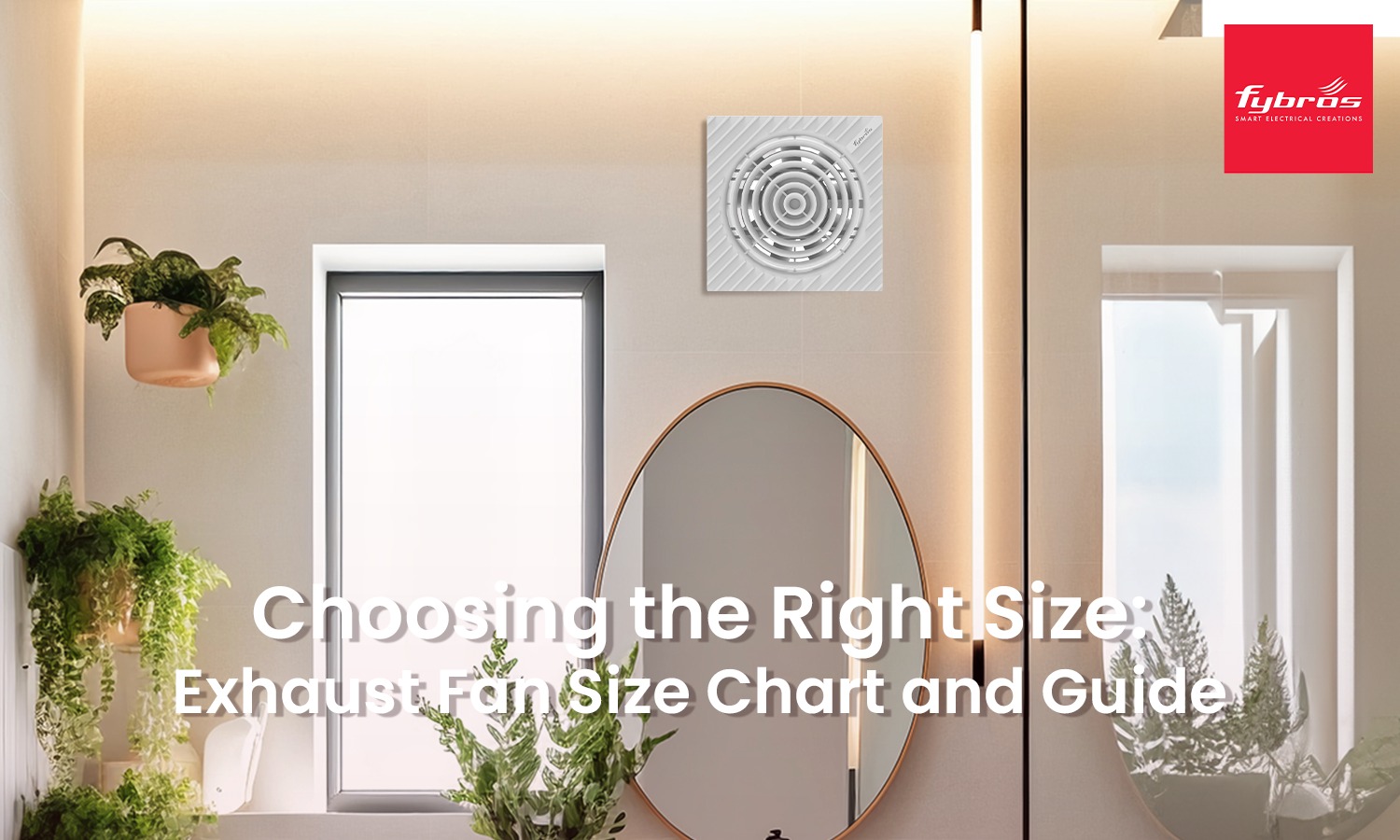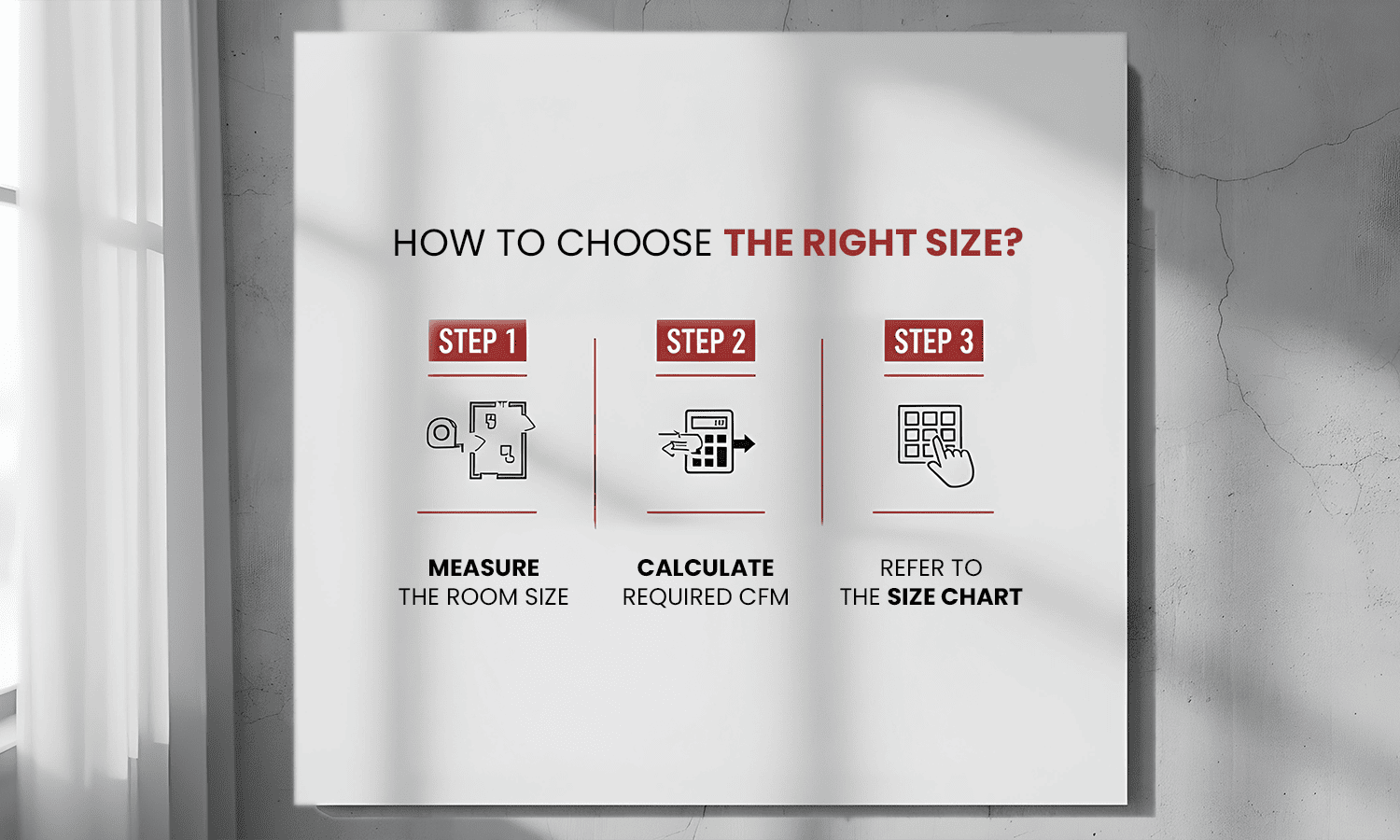
Selecting the correct exhaust fan size is crucial for maintaining air quality and comfort indoors. A properly chosen fan improves ventilation, removes odor, moisture, and smoke, and keeps rooms fresh. If you pick a fan that’s too small, it won’t effectively remove air; if it’s too large, it can waste energy.
The right bathroom exhaust fan size helps prevent mold and humidity buildup, while the proper exhaust fan size for the kitchen ensures that heat, smoke, and oil particles don’t linger. For homes with larger areas, a big-sized exhaust fan is ideal to move higher air volume. Whether you’re setting up ventilation in a toilet, kitchen, or general living space, the right exhaust fan size ensures the perfect balance of airflow and efficiency.

Before selecting the right exhaust fan size, calculate the total room volume (Length × Width × Height).
For example, a bathroom that measures 8×6×8 ft equals 384 cubic feet.
In a smaller area like a toilet, a 6-inch exhaust fan often does the job well. However, larger bathrooms might require higher capacity. Referring to a reliable exhaust fan size chart or exhaust fan size list can make the process simpler.
For larger spaces like commercial kitchens or utility rooms, you’ll need a big size exhaust fan or a model with a higher CFM (Cubic Feet per Minute).
To determine the ideal exhaust fan size, you’ll need to calculate the required CFM for your room :
You can use an exhaust fan size calculator to make this easier. Typically, kitchens need 10–15 air changes per hour, while bathrooms need about 8.
The toilet exhaust fan size and bathroom exhaust fan models are smaller, while kitchen exhaust fans demand a larger capacity. For example, if you cook often, a kitchen exhaust fan size chart suggests using at least a 10–12 inch model.
Use the exhaust fan size chart below to choose your model confidently. It shows ideal exhaust fan size measurements for different rooms:
| Room Type | Area (sq. ft) | Recommended CFM | Common Exhaust Fan Size (inches) |
|---|---|---|---|
| Small Bathroom / Toilet | 25–50 | 50–80 | 6-inch exhaust fan (Lush) |
| Medium Bathroom | 60–80 | 80–110 | 8-inch exhaust fan (Ventli, Ventflo ) |
| Kitchen | 100–150 | 150–250 | 10–12 inch exhaust fan(Exflo and Exflo plus ) |
| Large Room / Workshop | 200+ | 300–400 | 14–16 inch exhaust fan ( Exflo plus ) |
This exhaust fan size for room chart helps you avoid guesswork.
A small-sized exhaust fan works best for compact spaces, while a large-sized exhaust fan delivers stronger airflow for open kitchens or workshops.
Matching your exhaust fan size with your space is the key to cleaner, more comfortable air. Whether you’re buying a bathroom exhaust fan, a kitchen exhaust fan, or a toilet exhaust fan, make sure you refer to the exhaust fan size chart for the correct capacity.
If you’re unsure, use an exhaust fan size calculator to determine airflow based on room dimensions. A well-sized fan not only saves energy but also prevents dampness and odor buildup.
Always check the exhaust fan price, power rating, and size before purchase. Fybros offers efficient models across every exhaust fan size in inches, designed for durability and performance.
1. How to calculate the size of an exhaust fan?
Measure the volume of your room (L × W × H) and divide by 60, then multiply by air changes per hour. Use this to find the right exhaust fan size or consult a reliable exhaust fan size chart.
2. How to calculate CFM for room size?
Use an exhaust fan size calculator or check the exhaust fan size measurement to find the perfect match for your room.
3. Does exhaust fan size matter?
Yes, an undersized fan can’t remove enough air, while an oversized exhaust fan can lead to power waste and noise.
4. What Are the Effects of an Oversized Exhaust Fan?
A large exhaust fan can over-ventilate and reduce indoor comfort. Always refer to a kitchen exhaust fan size chart or bathroom exhaust fan size guide for accurate recommendations.